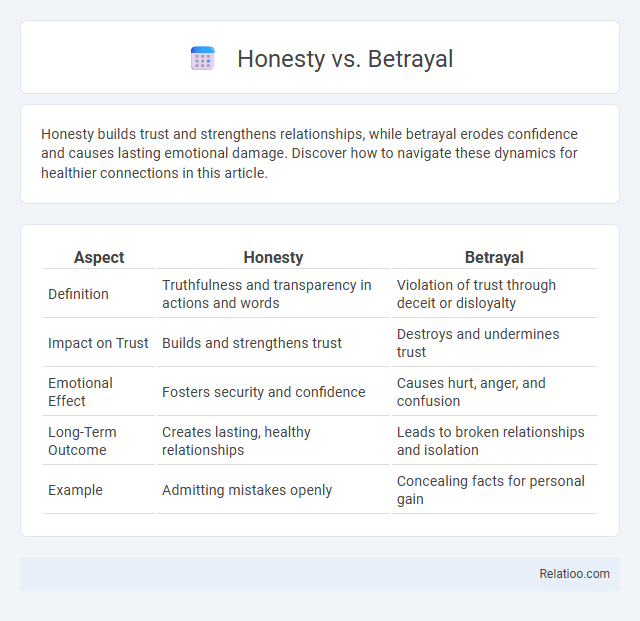Honesty builds trust and strengthens relationships, while betrayal erodes confidence and causes lasting emotional damage. Discover how to navigate these dynamics for healthier connections in this article.
Table of Comparison
| Aspect | Honesty | Betrayal |
|---|---|---|
| Definition | Truthfulness and transparency in actions and words | Violation of trust through deceit or disloyalty |
| Impact on Trust | Builds and strengthens trust | Destroys and undermines trust |
| Emotional Effect | Fosters security and confidence | Causes hurt, anger, and confusion |
| Long-Term Outcome | Creates lasting, healthy relationships | Leads to broken relationships and isolation |
| Example | Admitting mistakes openly | Concealing facts for personal gain |
Understanding Honesty: The Foundation of Trust
Honesty serves as the essential foundation of trust, enabling genuine connections and transparent communication in personal and professional relationships. Understanding honesty involves recognizing its role in fostering reliability, accountability, and integrity, which prevents the detrimental effects of betrayal. Trust built on honesty strengthens emotional bonds and supports long-term collaboration, while betrayal undermines these qualities, causing profound damage to interpersonal dynamics.
The Many Faces of Betrayal
Betrayal manifests in various forms, ranging from subtle deception to outright treachery, each impacting trust and relationships differently. Understanding the many faces of betrayal helps you recognize the signs and protect your emotional well-being. Honesty stands as the essential counterforce, fostering clarity and integrity amidst the complexities of human interactions.
Psychological Impact of Honesty
Honesty fosters trust, promoting emotional security and psychological well-being by reducing anxiety and enabling authentic relationships. Betrayal, by contrast, triggers feelings of vulnerability, anger, and deep emotional trauma, often resulting in long-term trust issues and decreased self-esteem. The psychological impact of honesty cultivates resilience and empathy, reinforcing positive social bonds and mental health stability.
How Betrayal Destroys Relationships
Betrayal acts as a severe rupture in trust, eroding the very foundation of any relationship by introducing doubt, resentment, and emotional pain. When honesty is replaced by deceit, Your ability to connect authentically is compromised, causing long-term damage that can be difficult to repair. The emotional scars betrayal leaves often lead to a breakdown in communication and the eventual collapse of intimacy between individuals.
Cultural Perspectives on Truth and Deceit
Cultural perspectives on honesty and betrayal vary widely, shaping how truth and deceit are perceived and valued across societies. In collectivist cultures, loyalty and group harmony often prioritize indirect communication, where deception may be tolerated to preserve relationships. Conversely, individualistic cultures emphasize personal integrity and transparency, viewing honesty as a fundamental virtue and betrayal as a profound moral violation.
Honesty in Professional Settings
Honesty in professional settings fosters trust, enhances teamwork, and cultivates a transparent work environment where ethical decisions prevail. While betrayal undermines relationships and damages reputations, consistent honesty supports accountability and long-term organizational success. Emphasizing integrity encourages open communication and strengthens collaborative efforts across all levels of a company.
Betrayal in Friendships and Family
Betrayal in friendships and family can deeply damage trust, often causing lasting emotional pain and fracturing relationships. Unlike occasional mistakes, betrayal involves a deliberate breach of loyalty, which undermines your sense of security and belonging. Recognizing the signs of betrayal early is crucial to protect your emotional well-being and rebuild trust.
Rebuilding Trust After Betrayal
Rebuilding trust after betrayal requires consistent honesty, transparent communication, and time to heal emotional wounds. Victims of betrayal need reliable actions that demonstrate accountability and remorse, while perpetrators must commit to genuine change and openness. Trust is gradually restored through patience, empathy, and reaffirmed integrity in relationships.
The Long-Term Benefits of Honest Behavior
Honest behavior fosters trust, strengthens relationships, and builds a reliable reputation that endures over time. In contrast, betrayal damages credibility, leads to loss of connections, and hinders personal and professional growth. Consistently practicing honesty creates sustainable success by promoting transparency and mutual respect.
Navigating the Gray Areas Between Honesty and Betrayal
Navigating the gray areas between honesty and betrayal requires a deep understanding of intention, context, and consequences. Your choices often reside in complex moral territory where transparency may conflict with loyalty, making it essential to evaluate the impact on trust and relationships. Balancing these factors carefully helps maintain integrity while avoiding harm, ensuring ethical decision-making in difficult situations.

Infographic: Honesty vs Betrayal
 relatioo.com
relatioo.com